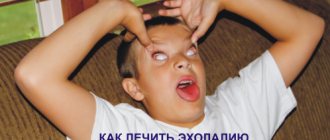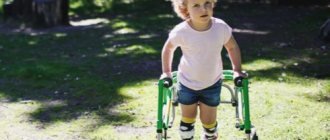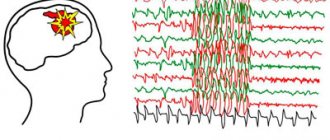- Features of the profession of a neuropsychologist
- What problems does a pediatric neuropsychologist solve?
- Pros and cons of the profession
- Skills required to work as a pediatric neuropsychologist
- Where to study to become a neuropsychologist?
- Place of work of a pediatric neuropsychologist
- Salary of a pediatric neuropsychologist in Russia
Neuropsychology is an effective therapeutic branch of psychology that is rapidly gaining popularity in our country.
In the last decade, correctional specialists have been faced with a sharp increase in the number of children whose parents and teachers discover difficulties in learning and communication. When working with such children, neuropsychologists use similar diagnostic and correction methods as with adults. Child neuropsychology is a younger field than adult field, but it is developing surprisingly quickly.
In this article we will tell you what problems a pediatric neuropsychologist solves in his practice, how to become one, and where you can work after training.
Features of the profession of a neuropsychologist
A neuropsychologist studies the impact the state of the brain has on a person’s behavior, psyche and capabilities.
A pediatric neuropsychologist uses knowledge of the anatomical structure and functions of each part of the child’s brain to:
- investigate mental disorders,
- correct mental processes and behavioral characteristics,
- work with the perception of the surrounding world, the development of attention, memory, thinking and speech in childhood.
For example, if a child is constantly distracted during school hours, and during recess he flies around the school like Batman, the problem does not always lie in the costs of education. It happens that a child simply cannot behave differently due to underdeveloped areas and other pathologies of his brain. A pediatric neuropsychologist, with the help of special exercises and corrective games, influences the development of the child’s brain, helping the little patient gain perseverance, diligence, attentiveness and memory appropriate for his age. Typically, the clients of a pediatric neuropsychologist are children aged from four to thirteen years.
How does a neuropsychologist differ from a psychologist, speech pathologist, psychiatrist and psychotherapist?
Many people confuse all these specialties with each other. To understand them, let's first group them into two categories: doctors and non-doctors. Doctors include psychiatrists and psychotherapists. Non-doctors: psychologists, clinical psychologists, speech pathologists and neuropsychologists.
Psychiatrists deal with seriously mentally ill people. To treat the mental health of their patients, they mainly use only medications. To work as a psychiatrist, you must have a higher medical education.
Psychotherapists work to heal mentally ill patients primarily through conversations structured in a certain way. To speed up recovery, these doctors may prescribe medications. To work you need a medical education.
Psychologists work with mentally healthy people. The main requests of clients at an appointment with a psychologist are related to conflicts, quarrels, and problems of self-realization. Psychologists do not work with mental disorders, because this is already the competence of a psychotherapist or psychiatrist, depending on the complexity of the case. To work as a psychologist, you do not need medical education.
Clinical psychologists are also not doctors, although they can work in medical institutions. They do not have the right to prescribe medications or diagnose patients. They are competent to work with slightly more complex cases than those taken on by an ordinary psychologist. The specialist treats patients simply by talking to them in a certain way about their feelings and emotions.
A defectologist works to correct incorrectly functioning mental functions of a person. This specialist helps patients through educational games, special exercises and creativity. And he's not a doctor.
Neuropsychologists work with almost the same mental defects as defectologists and clinical psychologists, only they look for the cause of the pathology in the patient’s brain itself, and not just in the psyche and consciousness. Despite the fact that neuropsychology borders on medicine, this field is still not medical.
What problems does a pediatric neuropsychologist solve?
Neuropsychology specialists supervise children:
- those suffering from cerebral palsy;
- those who suffered damage to parts of the brain in the early stages;
- having difficulties with controlling behavior (hyperactivity, or attention deficit disorder) and adapting to society;
- with low academic performance and slow learning of the school curriculum;
- with obvious increased fatigue;
- with a weak level of motor skills (the child is not up to the task of modeling, writing, working with small materials);
- with poor coordination of movements;
- with speech disorders;
- with sleep disorders;
- with a low level of development of memory, thinking and imagination;
- those suffering from impaired muscle tone (the child may feel insurmountable weakness and lethargy or, conversely, be overly excited);
- having difficulties communicating with teachers and peers.
Children with congenital mental disabilities, who have suffered serious head injuries, or with diagnosed dysfunction of subcortical and brainstem formations, also need consultation and assistance from a neuropsychologist.
The task of a neuropsychologist in working with children is to find the cause of the child’s learning, development, and behavior difficulties, to identify his strong and weak mental functions, to carry out correctional and developmental work, as well as to prevent disorders in order to prevent a recurrence of the problem in the future.
When to see a neuropsychologist
Consultation with a neuropsychologist is necessary for persons who have:
- disorders of speech and auditory, visual or tactile perception;
- problems with thinking, memory, attention, or voluntary regulation of movements;
- problems with controlling emotions.
It is recommended to show the child to a neuropsychologist if the child:
- has difficulty reading, writing or counting;
- remembers information poorly, cannot concentrate;
- suffers from speech impairments;
- impulsive, has poor self-control, is very slow or hyperactive;
- does not know where the right and left hand are after 6 years;
- differs in “mirroring” when writing;
- gets tired quickly;
- developmentally delayed;
- does not immediately respond to adults addressing him;
- cannot identify essential features of objects (size, etc.);
- Doesn't do homework well if he works independently.
It is especially important to see a doctor if the child has had a brain injury, birth trauma, undergone surgery under general anesthesia, or suffered severe infectious diseases at an early age.
Pros and cons of the profession
Like any other profession, neuropsychology has both its advantages and challenges.
The obvious advantages will be:
- ability to provide care to young patients;
- unconditional demand due to the narrow specificity of knowledge (of course, provided that the specialist has enough specific skills and has the appropriate education);
- interesting cases in practice;
- the opportunity to collect the necessary information for your own research (scientific work).
The disadvantages include:
- a high degree of responsibility to oneself, society and parents for the health and life of young patients;
- severe consequences of mistakes made: high professionalism and extreme care are required, because the further psychological state of the child directly depends on the chosen treatment methods and recommendations of the neuropsychologist;
- low wages for employment in government agencies;
- constant difficulties in the process of working with children who resist performing corrective exercises.
Diagnostics
For diagnostics in neuropsychology, the system developed by A.R. is usually used. Luria. During the diagnostic process, the neuropsychologist:
- describes the medical history and results of previous examinations (clinical case);
- describes the patient’s mental state taking into account the characteristics of his consciousness (emotional status, ability to navigate in time and space, criticality);
- examines attention (passive and voluntary) and memory;
- explores visual perception using real objects, tactile and auditory perception, motor activity;
- studies speech skills;
- analyzes the features of writing;
- explores intellectual processes, counting, reading.
Innovative developments (Wasserman method, etc.) can also be used in diagnostics.
Among the instrumental methods, EEG, CT, MRI, PET, etc. can be used.
Skills required to work as a pediatric neuropsychologist
It is clear that, in addition to scientific knowledge and skills, a pediatric neuropsychologist must also have personal qualities, which are essential in this profession.
Here are the top 6 personality traits and skills you'll need.
- The main thing here will, of course, be the ability to win over and inspire the unconditional trust of the young patient. After all, without trust there will be no relationship and mutual understanding, and, therefore, the treatment itself becomes impossible.
- Patience and iron endurance will also contribute to the result of the work. After all, you will have to talk with small children, and the child is not always able to clearly explain his condition or understand why he needs to follow all the doctor’s instructions.
- The ability to empathize and sympathize does not exclude the obligatory ability to abstract from work issues in time so as not to get into trouble yourself. After all, it is the profession of psychologist that is at risk for emotional burnout.
- A stable nervous system will help to cope with a high share of responsibility for the health of children.
- Knowledge of the English language contributes to the conduct of neuropsychological research, since most scientific works are published in English, and at international seminars there will be an opportunity to exchange experience with specialists from other countries.
- The desire to constantly improve and learn, including independently.
Career
One of the career paths for a neuropsychologist is the opportunity to become the head of a department. Many specialists open private offices and also engage in scientific activities, which often extend beyond the country. This opens up great prospects in international practice.
Professional knowledge
For a clinical psychologist in the field of neuropsychology, it is necessary to have knowledge in such areas as:
- psychophysiology;
- clinical and age anatomy;
- hygiene and physiology;
- psychotherapy;
- neurology;
- physiology of sensory systems, as well as higher nervous activity;
- psychiatry;
- physiology of the central nervous system.
Particular attention should be paid to the sections of these areas that are aimed at children.
A neuropsychologist must have an understanding of both clinical psychology and neuroscience in order to design effective treatment programs for patients. At the same time, he must monitor how effective the method of improving mental functions is, and also correct it in a timely manner. This is possible with the help of knowledge of modern diagnostic methods, as well as the ability to use them.
Where to study to become a neuropsychologist?
Our higher education system does not yet have a specialty in Neuropsychology, so first you need to get a diploma in psychology or clinical psychology, and then pursue advanced training in the desired direction.
For example, our academy offers a refresher course in “Childhood Neuropsychology.” The training takes place online, lasts only 200 hours and currently costs 5,800 rubles. During the training process, you will gain extensive knowledge in the field of the characteristics of brain activity in children and all kinds of clinical manifestations of the psyche in childhood, learn to diagnose abnormalities caused by brain damage and effectively correct their consequences.
Of course, it is naive to expect that training in a profession will be limited to a couple of weeks or months. A good practitioner studies constantly, regularly improves his skills, devoting a lot of time to self-education.
How to become a neuropsychologist
To become a neuropsychologist, you need to obtain a higher education in Neuropsychology. Specialists of this profile are trained:
- at Moscow State University M.V. Lomonosov;
- Ural Federal University of the first President of Russia B. N. Yeltsin;
- Chelyabinsk State University;
- Russian State University for the Humanities;
- First Moscow State Medical University I.M. Sechenov.
Neuropsychology is not a medical specialty. To take this course at the Academy of Professional Standards, you must have a degree in Psychology. Training is conducted in full-time and distance learning and includes lectures and practical classes with a total of 506 academic hours. Upon completion of the program, a standard diploma is issued, which allows you to immediately begin work in a new specialty.
Place of work of a pediatric neuropsychologist
After training, specialists who have mastered the profession of a child neuropsychologist can find employment in public or private institutions, neurosurgical clinics, medical and/or psychological centers.
Statistics say that three out of four first-graders need a pediatric neuropsychologist, so the danger of being unemployed is small. Qualified specialists are in high demand in educational institutions as educational psychologists, in children's development centers and in research companies.
Main responsibilities
A neuropsychologist studies the individual characteristics of the patient’s psyche and provides effective treatment. This makes it possible to improve the patient’s social adaptation to certain living conditions. In medicine, it is customary to distinguish two branches - adult and child neuropsychology. The second industry is just developing. The same specificity is used to determine the nature of the violation.
The main methods of neuropsychology are aimed at studying:
- personal characteristics;
- behavioral characteristics;
- voluntary actions and movements;
- cognitive processes (memory, speech, thinking, perception).
Scientific methods include:
- Comparative anatomical method. It is based on the principle of establishing a relationship between the way of life, behavior and the individual characteristics of the structure of the nervous system. With its help, the principle of operation of the brain is determined.
- Irritation method. It consists of analyzing mental functioning when exposed to the brain. The principle of influence can be direct, indirect, or through stimulation of individual neurons in the cerebral cortex.
Neuropsychology is still developing, and the human brain is not well understood.
Salary of a pediatric neuropsychologist in Russia
Salary will depend on the region of activity. According to published vacancies on labor exchange websites, at the start of a career, a Muscovite neuropsychologist can count on a salary of 20 thousand rubles, and an experienced specialist in the capital earns from 50 to 120 thousand rubles. In Russian regions the situation is more modest: here a beginning neuropsychologist receives about 16-20 thousand rubles, but with experience his salary increases to 45 thousand.
By running a private practice and having fundamental knowledge in the field of neuropsychology, the salary level can be raised significantly above the stated figures.
To sum up all of the above, we can safely say that the profession of a child neuropsychologist is already in demand in our country, and its popularity continues to gain momentum. The path to professional success will undoubtedly not be so easy, and will require you to spend effort, energy and time. But the more desirable is the final goal - to effectively help children with their difficult problems, change their world for the better and give them a carefree childhood and a happy future. Could adults have a more important task than this?
Photo: canva.com
Famous people in this profession
Luria Alexander Romanovich is the founder of Russian neuropsychology. The direction was opened after research into the mechanisms of the brain in those patients who suffered from local lesions of this organ, often as a result of trauma. Luria put forward the hypothesis that it is impossible to correct only one part of the brain: it is necessary to carry out complex work of all its nodes. He approved the classification of aphasic disorders and discovered several forms of speech disorders.
Velichkovsky Boris Mitrofanovich is a Russian psychologist, professor of neuropsychology, head of the department of neurocognitive sciences. He created more than 10 works devoted to research in the field of psychology and neuropsychology.
David Myers . American social psychologist. The author of famous works in the field of psychology, including the book “Social Psychology,” which makes it possible to understand the basic principles of this science using very simple examples.
Why does a child need a neuropsychologist?
What do parents want most? So that their child is healthy, smart and successful. Who knows for sure how to achieve this? Nobody. The world is changing so rapidly that you want to quickly teach your child to live in it. But the result is whims, absent-mindedness and failures in the diary. What they did wrong is unclear. A neuropsychologist will help you understand this issue.
Not everyone has any idea what kind of specialist this is. We suggest you figure it out. When is it worth using, and when does it no longer make sense? How can you help your child develop evenly at home? And what mistakes in parenting can be avoided?
Who is it?
Unlike psychologists who deal with the emotional sphere, neuropsychologists work on the development of mental functions - memory, attention, thinking, speech.
Science itself began to develop in the 30s of the 20th century. A series of wars left many soldiers wounded in the head - a large base appeared for studying the human brain.
Since the 70s, child neuropsychology has begun to gain momentum. The amount of research has grown, and now this is a very popular area, since children have developmental dysphasia and develop unevenly . This is influenced by methods of parental education, poor ecology, peculiarities of obstetric care, and IVF approaches to pregnancy planning. There are many factors.
Since 2014, the Elena Suslova Center for Pediatric Neuropsychology has been operating in Cheboksary. Elena notes that every year more and more people turn to them for help, and on their own initiative, and not on a referral from a neurologist.
How to understand that your child needs help from a neuropsychologist?
Eats sloppy.
At the age of 5-6 years, he cannot pour sugar into his glass and scatters it around the mug.
Motor clumsiness: bumps into other children, does not feel his size, cannot catch a ball, does not tie shoelaces well, has difficulty undoing buttons.
Can't sit still and constantly bumps into someone under the table.
There were difficulties at birth (asphyxia during childbirth, he became entangled in the umbilical cord, did not have time to turn over before birth), and convulsions occurred when he had a fever.
In neuropsychology, the body is the answer to questions. There is a imbalance - the mind is ahead of physical development. Later this will be reflected in the letter by missing letters. The child thought, but his hand did not have time to fixate, so the vowels begin to fall out, words are not completed, periods are not added. These are the first signals. But first it is better to consult a neurologist. It is possible that the damage to the nervous system was more severe than you realize.
– Elena, it turns out that what we perceive as a whim can have deeper roots and affect development?
– Diagnostics are needed to determine whether whims are caused by pedagogical inconsistencies, inconsistency of upbringing, or are associated with the physiological state of the child. For example, he is stuck on one emotion and cannot cry. Or he went to visit his grandmother, and then he jumps around until three o’clock in the morning and cannot sleep. Then his poor switchability is the subject of study by a neuropsychologist.
But the more you look at children, the more often you come to the conclusion that physiology is the basis of everything. The baby is 100% physiological. With age, the relationship between physiology and psychology begins to change. Suppose a child has a weak nervous system and gets excited quickly. Plus ends up in an inconsistent teaching environment, where he is not given boundaries and is not told “no”. And then all these physiological moments begin to take root and become character traits.
A four-year-old child cannot yet be defined as shy. At this stage, he adapts poorly - this is how his physiology works. And at the age of 12, if the psyche has no longer coped and has not developed any adaptive resources, he can already be called shy or withdrawn. But initially it is always just physiology.
– So neuropsychologists don’t work with adults?
– They work, for example, after strokes, but using different methods. We specialize in children and use the method of replacement ontogenesis . That is, the child and I return again to all the motor stages that he goes through from birth to one year. We crawl through them again, in the literal sense of the word, and see which functions the child has are better developed and which are worse. Let's say visual perception is well organized. Then it forms the basis, like a crutch, and through it we begin to drag those functions with which problems have arisen. And this reproduction of the motor period is, as it were, a restart of the system.
Although from my own experience I can say that with some persistence, older children can also show good results. I even feel it myself. For example, problems like “If Masha’s mother’s brother is Dima’s sister’s father, then who is Masha to Dima?” - Until I write it down, I read it thirty times, I can’t understand it. And now, to my surprise, once again I understood.
– So this is not just inattention?
– This is a question of spatial representations. In neurocorrection, we build the space of the body and master it: in front, behind, above, below, coordination of the right hand, left leg, eyes, hands, and so on. Due to this, the base of those formations that need to be represented in the mind is stronger. If I don’t understand my body well, I won’t be able to feel these things well at the level of thought.
Nerve cells do not recover
For a very long time it was believed that nerve cells do not recover. Now more and more scientists are saying that neurogenesis takes place. But for these new cells to form in a child, he needs to encounter different motor experiences. Don’t just watch an educational program while sitting in front of the TV, but do something with your own hands. Motor tasks include not only writing or constructing, but also jumping over a fence, climbing over, squeezing in. The more plastic the body is at the level of gross motor skills, the more base is created for fine motor skills to develop.
We hear about fine motor skills everywhere now, but it turns out that thousands of children who cope with fine motor skills continue to have difficulties with large motor skills. As a result, speech may suffer.
The nervous system is like a layer cake. First, a person learns to feel balance, then feel, touch, smell. Then comes eye-hand coordination - when I see what object I want to take and purposefully take it. Next, speech develops, regulation and only then learning. That is, speech cannot come before balance and all sensations of sensitivity have arrived.
Example
When you turn on the water tap, you hear the sound “schschschsch”, not “sssss”, but “schschschsch”. These sensory things create the basis for understanding speech sounds - when you tie your shoelaces, climb stairs, slide down a slide, learn to understand the tension required in the mouth to pronounce different sounds. Children who do not jump well also have difficulties with language. And if speech becomes unclear, writing suffers.
Advice from a neuropsychologist to parents
- Talk to your child more. Communication within the family suffers, but communication is useful because it teaches the child to express his thoughts adequately. At this moment his brain is structured. In the future, when he encounters some difficulties, he will be able to explain to himself why this happened and what to do now.
- Cook together. This is the best way to “pump up” a child on all fronts. There is texture, smell, taste, color and consistency. All senses are involved. You can also try the results of your work, evaluate and try to find a way to solve the problem - if, for example, you under-salted or over-salted the dish.
The psyche develops from simple to complex, and neurocorrection helps lay the foundation. However, it does not fill gaps in knowledge , so the sooner you start, the greater the chance that the child will not develop gaps.
Elena Suslova : Fifth graders come to us, and many of them have gaps precisely at the level of 5-6 years, when pre-mathematical concepts are formed: “in-on”, “for-under”, “older than”, “younger than”, “ the store is further than the school,” “Misha is stronger than Petya.” If I understand this poorly, then I cannot move on to abstract concepts like X and Y in mathematics. When a teacher communicates with a student, he gives him information to the left hemisphere, where speech is recognized. And the right hemisphere at this moment should create images. It's the same with reading. I read, and the right hemisphere creates images. I'm getting curious. Those whose right hemisphere is not included in this process read, connect words into sentences, but perceive it as torture.
– What is the reason for the fact that children have little accumulated experience?
“It’s like there’s a race going on now.” Right from birth they try to teach children to read so that they come to school and already know everything. The child receives the load at the wrong time and not the one he needs. If he has good genetics or a high cognitive interest, he will understand everything and grasp it. But if at the same time the level of the right hemisphere, where “I feel, touch, smell, touch and feel,” remains raw, then you have to arrange dances with tambourines in order to extract knowledge from the child. The load is given immediately to logic, but not enough in the area of feelings. And a child who does not understand his body remains unable to feel the emotions of other people. Each age has its own challenges. For preschoolers, this means being able to play well. Don't assemble Legos, but play pretend from the series “Knock-knock!” Who's there?". It is social interaction that provides a strong base, thanks to which a child can come to school in September less prepared, and in November catch up with everyone else. He will have such a number of neural connections in his head that his brain will solve any problems with lightning speed.
The more neural connections, the more detours are formed. And when there is no practical experience, the child is lost.
– The fact that children now know how to read and write before school is not a biological tendency due to evolution?
- This is a distortion. Children come to us for diagnostics, then we talk with their parents for twenty minutes. At this time, the child in the corridor must occupy himself with something. They can't, don't know how to play.
– Of the conditional 100 percent of children, how many require neurocorrection?
– In fact, 100 percent of them need at least a single visit to a neuropsychologist for consultation in order to determine whether there are difficulties and how capable the child is of solving them. It would be nice for everyone to have a look before the first class.
When is a neuropsychologist not a help?
Children under 3 and over 12 years old (for girls - before their first menstruation).
With the onset of adolescence, the task of hormonal changes comes to the fore for the brain; it becomes less flexible for correction. For autism. This is where a behavior therapist is needed.
When diagnosed with mental retardation, a special teacher is needed.
If the teaching environment is not ready for change, parents do not listen to the specialist’s recommendations when the problem is primarily in the family system.
The Elena Suslova Center employs five specialists: three neuropsychologists, a speech pathologist and a psychologist. First they conduct a diagnosis. If necessary, a course of correction is prescribed.
One course of neurocorrection lasts two months, classes are held twice a week. Then a pause of equal duration, when it is recommended to additionally work out either with a defectologist, or with a speech therapist, psychologist, or add sports activities. It is impossible to combine everything together, since specialists stimulate different parts of the brain, and the child may experience overload. Individual lessons.
If you have read this material and realized that your child needs help or advice, you can contact the Center for Pediatric Neuropsychology at the addresses: Cheboksary, Privolzhsky Boulevard, 4/1 (SZR) and Egersky Boulevard, 48 (NYR).
Phone numbers for details and pre-registration: +7 (8352) 655-325, +7 905 198-33-25.











